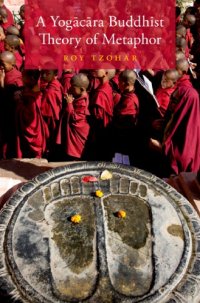
Ebook: A Yogacara Buddhist theory of metaphor
Author: Tzohar Roy
- Tags: Buddhism and philosophy, Buddhist philosophy, Metaphor, Metaphor--Religious aspects--Buddhism, PHILOSOPHY--Eastern, Yogācāra (Buddhism), Electronic books, Metaphor -- Religious aspects -- Buddhism, Yogācāra (Buddhism), PHILOSOPHY -- Eastern
- Year: 2018
- Publisher: Oxford University Press
- City: New York;NY;United States of America
- Language: English
- pdf
Cover; Half title; A Yogācāra Buddhist Theory of Metaphor; Copyright; Dedication; Contents; Acknowledgments; Abbreviations; Introduction; 1. What Do Buddhists Have to Say About Figurative Language?; 2. A Bit of Methodology: On Determining the Relevant Textual Field and Handling Intertextual Borrowing; 3. An Outline; 1. Metaphor as Absence: The Case of the Early Nyāya and Mīmāṃsā; 1.1. What Is Metaphor (Upacāra)?; 1.2. Upacāra in the Early Mīmāṃsā School; 1.3. Upacāra in the Early Nyāya School; 1.3.1. The view that nouns do not refer to an individual entity (vyakti);The Yogacara school of Buddhist thought claims that all language-use is metaphorical. Exploring the profound implications of this assertion, Roy Tzohar makes the case for viewing the Yogacara account as a full-fledged theory of meaning, one that is not merely linguistic, but also applicable both in the world and in texts.
Download the book A Yogacara Buddhist theory of metaphor for free or read online
Continue reading on any device:

Last viewed books
Related books
{related-news}
Comments (0)